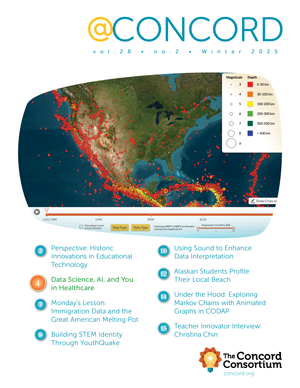News at Concord Consortium
Electronic Circuits and Online Performance Assessments
In previous work we have found that students’ scores on question-and-answer tests are not reliable predictors of their ability to perform a corresponding task. This finding casts considerable doubt on the central premise that the assessment tools we use to evaluate student learning constitute a reliable measure of the knowledge and skills we intend to measure. Insofar as the entire United States educational enterprise increasingly revolves around just such assessments, a methodology for dramatically improving them could be transformative.
The Simulations for Performance Assessments that Report on Knowledge and Skills (SPARKS) project will produce a sequence of computer-based assessments using simulations of electronic circuits and test equipment. Aligned to the content of an introductory college-level electronics course, these assessments will be designed for the classroom or as self-paced tests to be taken by students outside of class. As students build simulated circuits and test them, their actions will be monitored and analyzed for evidence of content knowledge and troubleshooting skills. Results will be reported to the students, who will be given the opportunity to correct errors and improve their performance.
The three-year project is funded by a grant from the Advanced Technological Education (ATE) Program of the National Science Foundation, and is a collaboration of the Concord Consortium, CORD, and Tidewater Community College.
Over 200,000 Molecular Workbench Downloads
In the last two years, our Molecular Workbench software has been downloaded 209,400 times from users in all 50 states plus over 150 countries worldwide. That’s an average of 500 students using these activities daily. Download the free software and learn about the molecular world with activities for physics, chemistry, biology, nanoscience, biotechnology, and more at mw.concord.org.
Global Lab Goes To Russia
In the 1990s, students from 120 high school classes worldwide participated in the first NSF-funded Global Laboratory Projects by exploring outdoor study sites and indoor air quality and sharing their local histories with an online community. Begun at TERC in Cambridge, Massachusetts, under Boris Berenfeld and Robert Tinker, Global Lab has a new incarnation at the Concord Consortium and the National Training Foundation of the Russian Federation.
With funding from the World Bank to the Russian Ministry of Education, Global Lab has been transformed into a two-year integrated science curriculum for students in grades 5-6. Used by more than 30 schools in the broad Russian Federation as a core science course, the curriculum aims to teach not only science process skills, emphasized by the first Global Lab, but also all science concepts prescribed by the comprehensive Russian National Standards. In addition to a student textbook, teacher guide, and lab and field journals—all freely available online as PDF documents—teachers can download 100 multimedia lessons on environmental science.
The Russian National Training Foundation offers teacher preparation master classes run by project staff and experienced teacher-trainers. Russian Global Lab (www.globallab.ru) hopes to recruit 50 to 60 additional Russian schools this year and welcomes international participants.
